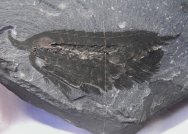Leanchoilia
superlata
Phylum
Arthropoda
Geological
Time: Early Cambrian, (~520 million years ago)
Size: Fossil
is 73 mm overall, plus 25 mm appendage
Fossil
Site: Burgess Shale, Stephen Formation, Burgess Pass, British Columbia,
Canada
|  Description:
Leanchoilia superlata is an unusual arthropod found in the Burgess
Shale Fauna of British Columbia. It is a member of a group of “great
appendage arthropods” known as opabinids after the bizarre
Opabinia from the Burgess Shale. It is possibly also known from
Utah and Greenland, and has an older relative Leanchoilia
illecebrosa found in the Chengjiang
Biota of China. Description:
Leanchoilia superlata is an unusual arthropod found in the Burgess
Shale Fauna of British Columbia. It is a member of a group of “great
appendage arthropods” known as opabinids after the bizarre
Opabinia from the Burgess Shale. It is possibly also known from
Utah and Greenland, and has an older relative Leanchoilia
illecebrosa found in the Chengjiang
Biota of China.
The
contrast between the specimen and the matrix has been enhanced
by a chemical process that removed some of the  matrix
overburden. Before photos below show the
difference such treatment makes. Since the specimen is typically
covered with resistant mica and is composed of the carbonized remains
of the animal, it is inert to the treatment. The result you see
here is all natural. There has been no paint added to bring out
detail. This wonderful example shows incredible detail for a specimen
more than a half billion years of age as the Cambrian Explosion
was in full bloom. Notice the upturned “snout,” the
sweeping appendages, body segments, and gut trace as well as the
gill filaments of the biramous swimming appendages. The speciomen
displays the characteristic sheen for which Burgess specimens are
famous. Additionally, there is a partial second example to be seen
at the lower right. It occurs at a slightly lower horizon than
the main specimen, and shows only a small portion of the anteriormost
part of the specimen, including a partial appendage. Leanchoilia
superlata is also quite rare in the Burgess Shale: for each 1000
Burgess specimens only 2 are Leanchoilia;
even fewer are as complete in this excellent
fossil. matrix
overburden. Before photos below show the
difference such treatment makes. Since the specimen is typically
covered with resistant mica and is composed of the carbonized remains
of the animal, it is inert to the treatment. The result you see
here is all natural. There has been no paint added to bring out
detail. This wonderful example shows incredible detail for a specimen
more than a half billion years of age as the Cambrian Explosion
was in full bloom. Notice the upturned “snout,” the
sweeping appendages, body segments, and gut trace as well as the
gill filaments of the biramous swimming appendages. The speciomen
displays the characteristic sheen for which Burgess specimens are
famous. Additionally, there is a partial second example to be seen
at the lower right. It occurs at a slightly lower horizon than
the main specimen, and shows only a small portion of the anteriormost
part of the specimen, including a partial appendage. Leanchoilia
superlata is also quite rare in the Burgess Shale: for each 1000
Burgess specimens only 2 are Leanchoilia;
even fewer are as complete in this excellent
fossil.
|
|








